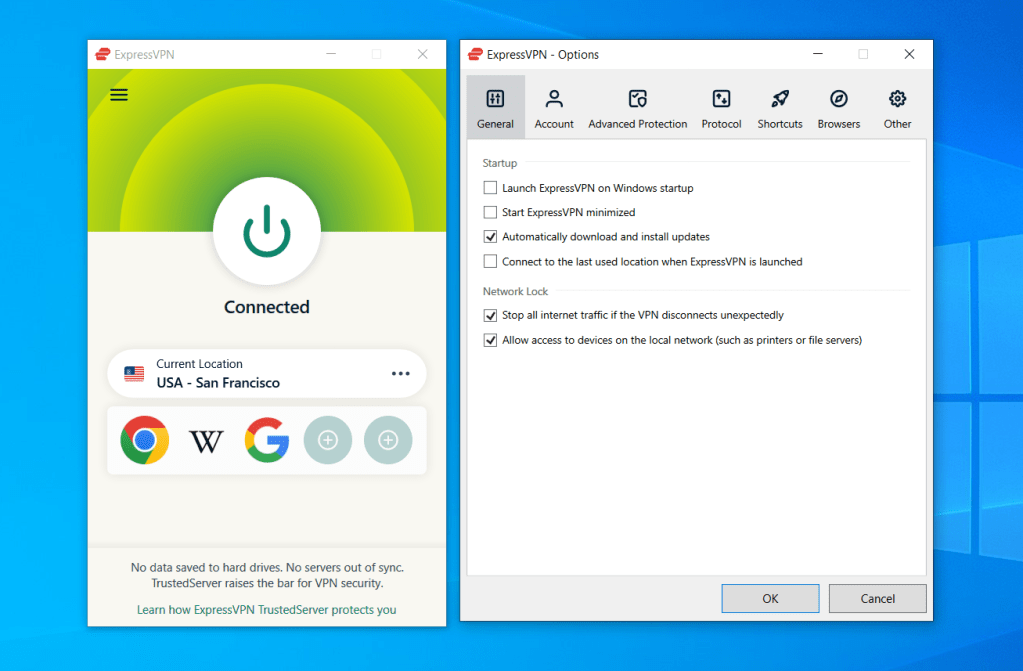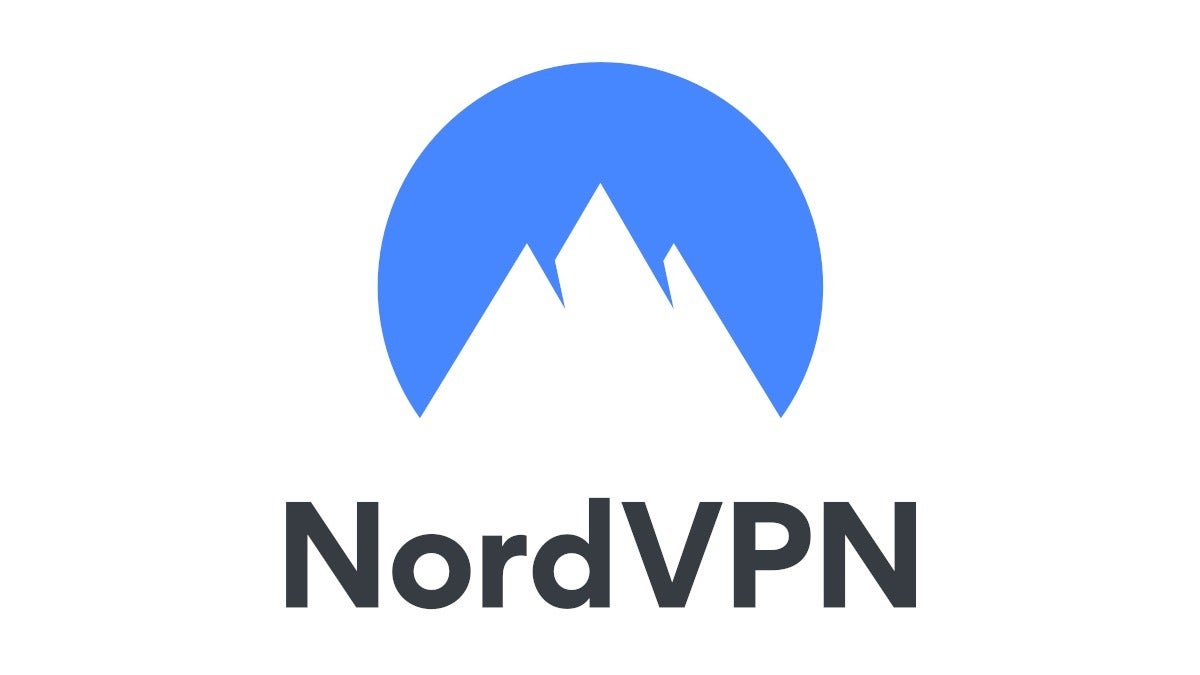Expert's Rating
Pros
- Excellent speeds
- Easy-to-use interface
- Unblocks all streaming services
- Great security and privacy practices
Cons
- More expensive than many competitors
- Light on some features for a top VPN
Our Verdict
ExpressVPN provides an exceptional service with fantastic speeds, an easy-to-use Windows desktop app, transparent privacy, and solid security features. Very few other VPNs right now can match it. It’s more expensive than many other services, but you sure do get a lot of VPN for your money.
Price When Reviewed
This value will show the geolocated pricing text for product undefined
Best Pricing Today
ExpressVPN in brief:
- P2P allowed: Yes
- Unlimited device connections: No, 8 simultaneous device connections
- Business location: British Virgin Islands
- Number of servers: 3,000+
- Number of country locations: 105
- Cost: $12.95 per month, or $99.84 for a year
When you think of VPNs, ExpressVPN is likely one of the first names that pops into your head. That’s no surprise as the company has blanketed the internet with ads and it’s likely you’ve seen at least one somewhere out in the wild at this point. And while you may disagree with its inescapable promotions, you can’t deny that it provides a great service.
It is, and has been, one of the most trustworthy and notable VPN providers on the market for years now. Since its acquisition by Kape Technologies in 2021, it has gained the financial backing to step up its game even further. Just since our last review, ExpressVPN has undertaken dozens of independent security audits, launched an Apple TV app, and added its own built-in password manager. It has become a one-stop privacy and security powerhouse.
Further reading: See our roundup of the best VPNs to learn about competing products.
What are ExpressVPN’s features and services?
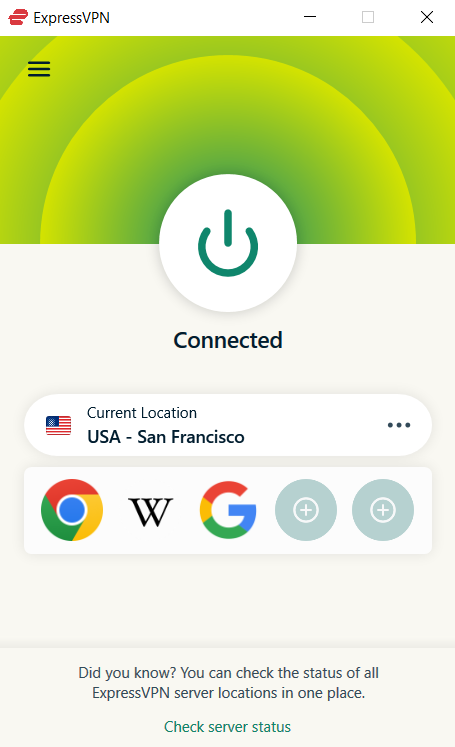
ExpressVPN homescreen.
Sam Singleton
When you first open ExpressVPN, It has a simple single-panel interface with a connected/not connected button in the center, and the country selection below it. Then below that it shows the best smart location based on your geo data. The interface looks about the same as it has for a few iterations now and that’s because it’s simple and effective—if it ain’t broke don’t fix it.
When connected, the screen remains largely the same except that ExpressVPN will now show a selection of quick links to websites and internet-connected apps such as Google, Wikipedia, and Gmail. You can edit these shortcuts to customize them for your uses.
If you click the drop-down menu in the upper-right corner, you can access additional things such as VPN Locations, Options, and Help & Support. The Options menu is where the meat of your settings are located. Here ExpressVPN offers a decent variety of customizable features, the highlights being a kill switch, split tunneling, and ability to switch protocols. All of these are fairly standard across all VPN services.
Notably, however, ExpressVPN does not offer a multi-hop feature to allow you to further obfuscate your connection by sending it through multiple VPN servers rather than just one. This is unfortunate as many competitors already offer multi-hop connections and it’s an increasingly popular feature among users. For a service such as ExpressVPN to not have multi-hop, I’m left feeling a bit disappointed.
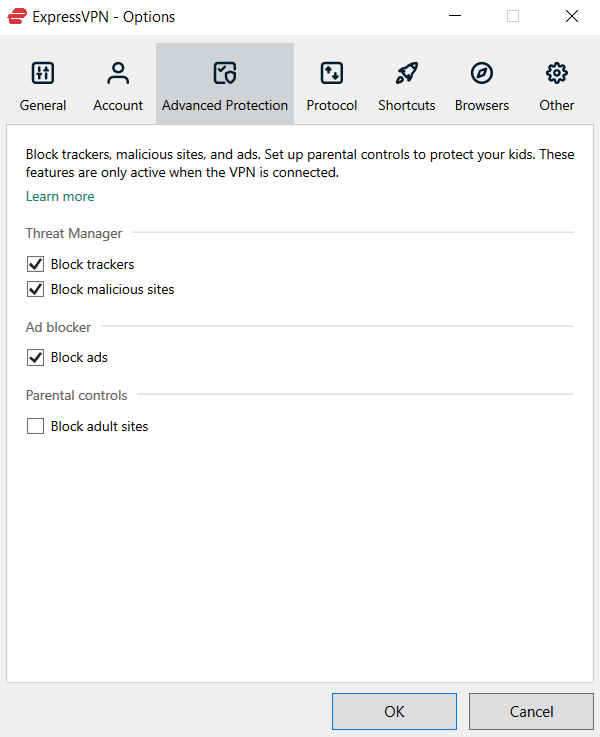
ExpressVPN also offers an optional ad- and tracker-blocking service.
Sam Singleton
Additionally, under the Options menu, you can enable ExpressVPN’s own ad- and tracker-blocking service called “Threat Manager.” There is also the option to turn on parental controls to block adult sites in case your kids are using the service as well. This addition of a full-security suite on top of the VPN is something that a lot of the top VPN providers such as Surfshark and NordVPN are offering now, too. It’s certainly nice to have and you won’t find me arguing against it, but at this point there are likely better stand-alone security suites that offer better blocking and protection.
It’s also worth mentioning that while I focused on the Windows app for the purposes of this review, ExpressVPN does offer incredibly broad device and browser support. Besides Windows, it’s available for MacOS, iOS, Android, Linux, ChromeOS, Fire Stick, Android TV, capable routers, and most recently Apple TV. Not to mention that ExpressVPN’s browser extensions from Chrome and Firefox let you control the app from the browser instead of acting as simple browser-only proxy connections.
At the time of this review, ExpressVPN is being offered for $12.95 per month or $99.84 for an entire year. That monthly price is a bit steep. The yearly price makes it a little more affordable, but it still ranks among one of the more expensive VPN services. There is no free option to try out ExpressVPN, but it does offer a 30-day money-back guarantee if you decide that it isn’t for you. Subscription payments can be done via credit card, PayPal, or BitCoin.
How is ExpressVPN’s performance?
When testing how fast a VPN is, I rate the service’s speeds across servers in five different countries all around the world over the course of a few days and then compare them to my baseline internet speed during that time. In my testing, ExpressVPN server speeds were excellent. Across all locations tested, the average download speed was 71 percent compared to the base speed and the average upload speed was an equally impressive 80 percent compared to the base. That firmly puts it into our top five fastest VPNs, and places as one of the speed kings—the Hamilton to NordVPN’s Verstappen if you will.
With these speeds you aren’t likely to notice much, if any, buffering issues while streaming, or lag while gaming. Admittedly, the speeds are a tiny bit slower than the last time we reviewed it, but not in any noticeable way. It’s still a lot faster than most services we’ve evaluated and is more than sufficient to accommodate a home user’s online activities.
ExpressVPN has long promised that it will unblock Netflix and that still holds true. In fact, it not only unblocked Netflix, but also any other major streaming service that I tested including Amazon Prime, HBO Max, Hulu, Disney Plus, and AppleTV.
As far as user privacy is concerned, there aren’t many better VPNs out there than ExpressVPN.
How is ExpressVPN’s security and privacy?
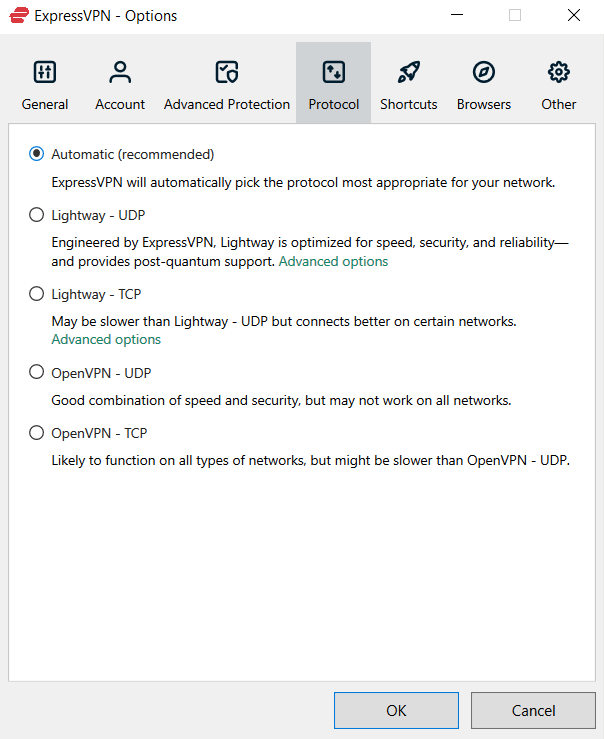
ExpressVPN offers its own Lightway and OpenVPN protocols.
Sam Singleton
ExpressVPN focuses mainly on two different VPN protocols: OpenVPN and its proprietary Lightway protocol. It uses this homegrown Lightway protocol to connect by default—this can be changed under the Options menu if you wish. The company created the new protocol to serve its needs as a public VPN provider.
The Lightway protocol is open source, and you can find it on GitHub. It’s also undergone a security audit by the penetration testing firm Cure53. One thing the company didn’t create from the ground up, thankfully, is the encryption. For that, Lightway uses wolfSSL, an open source SSL/TLS library.
If you don’t want to use Lightway, you can specify OpenVPN instead. IKEv2 and L2TP/IPSec protocols are available as well depending on your operating system. The easiest thing to do is let ExpressVPN choose the protocol automatically, which I recommend for most users.
The recent update to Lightway came in October 2023 with upgrades to “post-quantum” encryption support to help combat cyber attacks by quantum computers. As myself, and I’d suspect most PCWorld users are not likely to have access to a quantum computer at the moment, I’d probably file this under superfluous, but nice to have.
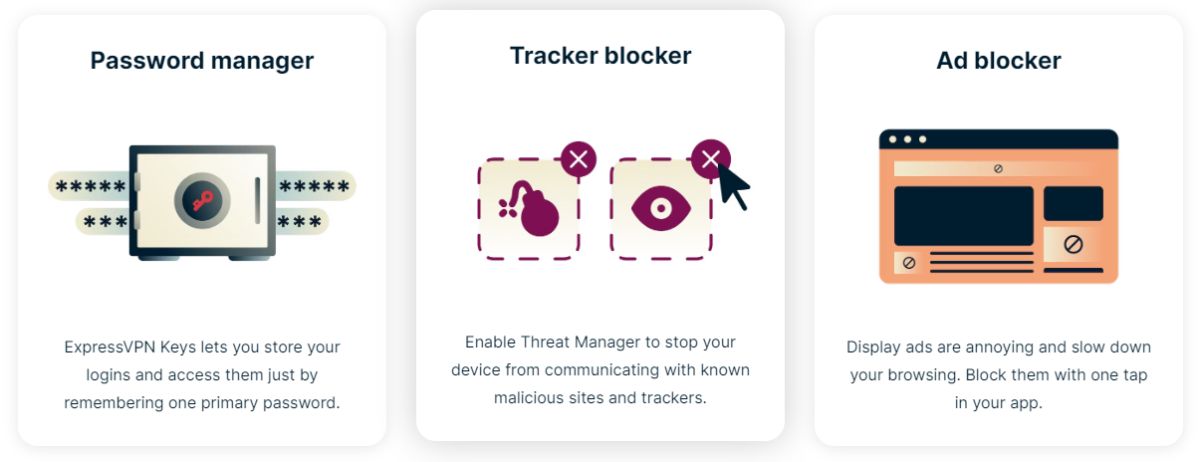
ExpressVPN just added a password manager feature to its suite of security services.
ExpressVPN
As far as user privacy is concerned, there aren’t many better VPNs out there than ExpressVPN. It claims not to log any of your browsing history, or other personal data such as DNS queries, IP addresses, connection timestamps, or session duration. It does keep diagnostic and crash reports, but one thing that I really like is that ExpressVPN’s app on Windows asks you up front if you want to contribute this data. More of these options in the future, please.
The service is remarkably upfront about what it does and doesn’t track and it backs up its claims too, with numerous independent audits. In 2022 alone, ExpressVPN underwent 12 audits on various parts of its service. The most recent audit was done by Cure53 in November of 2022 and confirmed ExpressVPN’s no-log policy. Surely, the sheer number of independent audits makes ExpressVPN unmatched among all VPN providers. It’s a level of transparency that can only be applauded.
Furthermore, ExpressVPN is located in the British Virgin Islands which is not subject to any international signals intelligence-sharing alliance or data retention requirements. Meaning it’s much more difficult for any government to force ExpressVPN to share any data about users or servers. Turkey even forcefully seized ExpressVPN servers in 2017 and still came up with nothing—I call that the ultimate independent audit.
Is ExpressVPN worth it?
Frankly, yes. In fact I don’t think that there are many VPN services on the market today that rival ExpressVPN. Its combination of excellent speeds, ability to unblock every streaming service, and dedication to user privacy hits all of the right notes. Add to that an interface that is dead-simple to use and broad device support and you get a VPN that ticks (almost) every box. It might lack some tweakable power-user security features, but most of us won’t even notice these things.
ExpressVPN isn’t the cheapest option available, but for everything that it offers, the higher price is more than worth it. Practically everything about this service is top-tier and as a whole, ExpressVPN is quite simply one of the best VPNs right now.
Editor’s note: Because online services are often iterative, gaining new features and performance improvements over time, this review is subject to change in order to accurately reflect the current state of the service. Any changes to text or our final review verdict will be noted at the top of this article.
